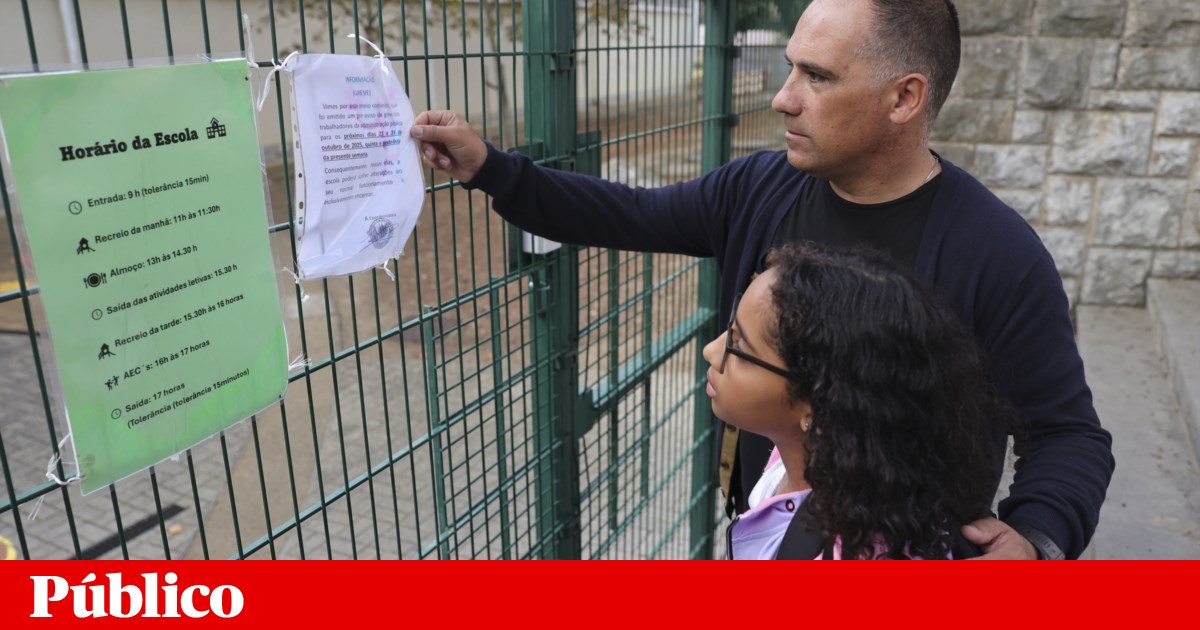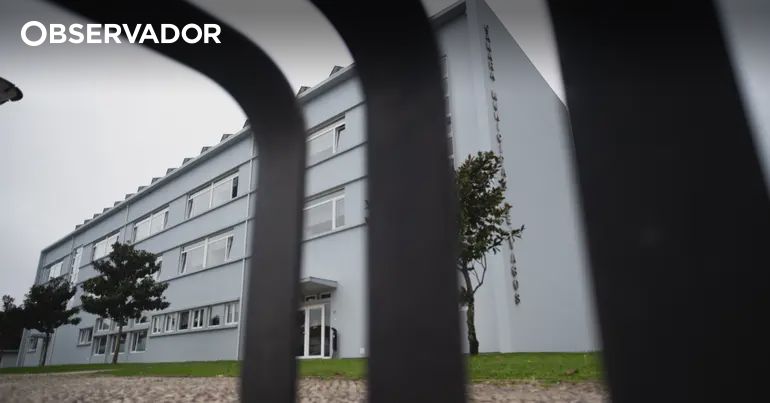Public Sector Strike Halts Services Across Portugal
Union leaders from the Frente Comum de Sindicatos da Administração Pública and the Federação Nacional dos Professores (Fenprof) have hailed the strong participation in the national strike this Friday, which has paralyzed schools, health services, and other state sectors.
Near the closed António Arroio Artistic School in Lisbon, Sebastião Santana, coordinator of the Frente Comum, alongside Fenprof's secretary-general José Feliciano Costa, highlighted that the waste collection sector saw a 90% adherence to the strike overnight.
"This strike began in the night shift on Thursday in hospitals and waste collection. Participation was very high overnight. Hospitals are mostly operating with minimum services, from Tondela to Faro, including major urban centers," described Sebastião Santana.
The Frente Comum leader predicted that the morning scene at António Arroio would replicate throughout the country. "There are reports of schools closed nationwide, and others we know won't open at all, and this will multiply across Public Administration services," he stated.
On the terraces in front of the Lisbon school, known for its avant-garde arts focus, dozens of students gathered this morning after finding the gates shut. "It's 8 AM, schools would be reopening now, but we're already aware of what's happening across the country. I'm still receiving messages on my phone. We have schools closed in Viseu, Covilhã, Almada, Sintra, Vialonga, even in Lisbon city," reported Feliciano Costa.
The Fenprof leader added that "this strike will also have a major impact in Education due to school closures, which mean non-teaching staff are on strike and teachers are on strike," giving examples where "out of 12, 13, or 14 teachers, 11 to 12 are on strike."
Also present at the gathering was presidential candidate António Filipe, a former vice-president of the Assembly of the Republic and historic PCP deputy, "in solidarity with the workers."
"It's unquestionable that the country needs good public services. We have very serious deficits in general. Public Administration careers need to be attractive. What's being discussed in the State Budget [for 2026] doesn't point to that at all," he lamented.
Healthcare Services Severely Affected
In health, the president of the Federação Nacional dos Médicos (FNAM) stated that the strike is affecting all scheduled activities in hospitals and health centers, blaming the government for being "totally intransigent" in negotiations.
Near Hospital de São João in Porto, Joana Bordalo e Sá deferred providing numbers on strike adherence until late morning but indicated that the protest's effects would be most felt in consultations and operating rooms, regarding scheduled surgeries.
She assured, however, that minimum services would be "scrupulously complied with." In statements to journalists, the FNAM leader reiterated the call for the resignation of Health Minister Ana Paula Martins, accusing the Luís Montenegro government of "doing nothing to be different."
"We are witnessing the destruction of the Serviço Nacional de Saúde (SNS)," because "there is no investment in its human resources, whether for doctors still in the SNS or for younger doctors we're training who can't see a future perspective," she emphasized. And added: "There's no prospect of valuing our career, and that's why we're on strike today. It's not just about valuing our career but above all defending the public service, our SNS."
Joana Bordalo e Sá pointed to issues in obstetrics, with births occurring in streets and ambulances, demonstrating "the destabilization within the Serviço Nacional de Saúde, which will worsen with the execution of Minister Ana Paula Martins' plan to create regional emergency services."
"A regional emergency service is different from a metropolitan emergency service. We're here in Porto, and the metropolitan emergency is handled between hospitals a few kilometers apart. A regional emergency doesn't work that way," she argued.
In her view, the Health Minister wants "to force doctors to be mobilized to provide these emergency services, which isn't even possible for doctors under the FNAM collective agreements, as they can't be relocated to work outside their municipality."
"This measure of forced mobilization of doctors doesn't serve the doctors, but above all, it doesn't serve the population," she stressed.
The Luís Montenegro government "is telling the population, regarding regional obstetrics emergencies, that they will lose local services. Meaning, pregnant women and babies will have to travel kilometers and kilometers to receive care."
She cited the Setúbal peninsula as an example, which "serves almost a million people. By closing the obstetrics emergencies in Barreiro and Setúbal, pregnant women and babies will travel dozens, if not hundreds, of kilometers to give birth in Almada, and even the Almada emergency service can't guarantee 24/7 operation."
"Often, pregnant women and babies have to be redirected to Lisbon. So, this is another measure showing disinvestment in the Serviço Nacional de Saúde, and that's why we're here today," she noted.
Joana Bordalo e Sá told journalists that an online negotiation meeting is scheduled between FNAM and the Ministry of Health this Friday afternoon to "probably present the final version of this regional emergencies decree and the decree for high-performance centers in gynecology and obstetrics," of which the leader said she only knows "some excerpts where this forced mobility is evident."
"We still don't have any meeting scheduled to negotiate working conditions through the revision of our collective work agreements. We've already submitted those revision proposals, but they intransigently refuse to negotiate with doctors; it's clear that's the path," she added.
Thus, she considered, "there is no dialogue. This Health Minister isn't dialoguing with doctors. On the contrary, she wants to impose a solution that won't serve doctors or the population. And regarding doctors, what will probably happen is that even more doctors will leave the SNS."
About the meeting scheduled for 3:15 PM today, the FNAM leader said she expects "the same attitude of imposition, not genuine dialogue, serious negotiation with measures that truly serve doctors and the population."
"Obviously, the Federação Nacional dos Médicos keeps solutions on the table, is available to dialogue, and for our solutions to make a difference, so that services aren't lacking for pregnant women, babies, children, the elderly, all the population, because our Serviço Nacional de Saúde must be close to the population, public, accessible, universal, and a guarantor of our democracy," she affirmed.
For this reason, "we continue to say that Luís Montenegro must undoubtedly replace the leadership of the Ministry of Health," she said.
The Federação Nacional dos Médicos already called for the resignation of Minister Ana Paula Martins in the summer of 2024 and maintains that position "because, in fact, what's happening is an SNS adrift, an INEM still adrift, all health is heading towards degradation," while seeing "the private sector investing millions. In fact, they've already invested a billion euros because they know the Luís Montenegro government will give them returns," added Joana Bordalo e Sá.
Widespread Disruptions Beyond Education and Health
Beyond Education and Health, disruptions are expected due to the absence of public transport workers, inspectors, tax authority staff, judicial officials, among others.
Salary increases, career valuation, restoration of public employment ties, and defense of public services are also reasons for calling this "great strike," which covers all state workers.














Comments
Join Our Community
Sign up to share your thoughts, engage with others, and become part of our growing community.
No comments yet
Be the first to share your thoughts and start the conversation!